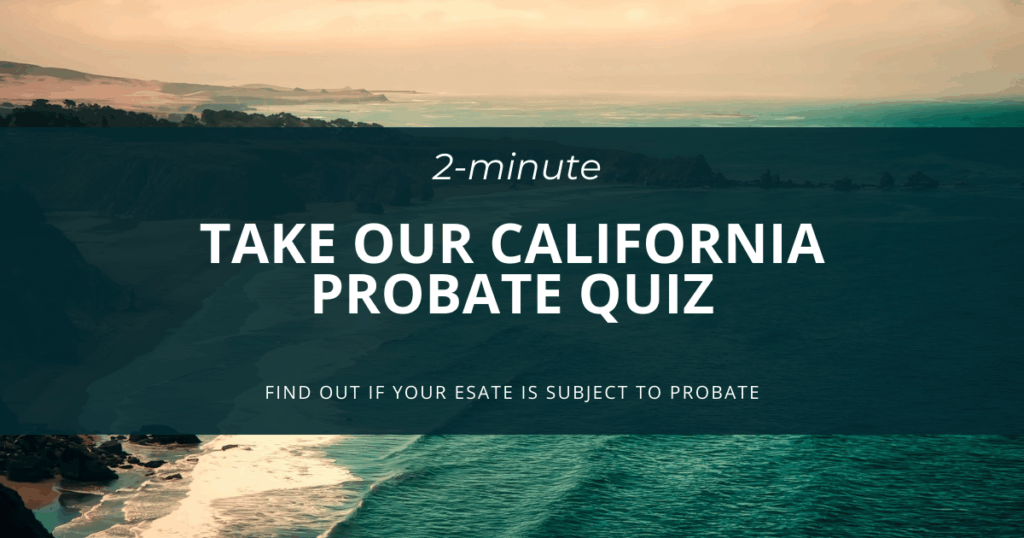California Probate Quiz: Determine If Probate Is Required and How to Navigate the Process
Unsure if your estate will face formal court oversight after you pass away?
Discover whether probate applies to your assets, understand the impact on your heirs, and learn practical ways to streamline or avoid the process with our California Probate Quiz.
This interactive assessment helps you determine if probate is required, highlights updated thresholds for 2025, explains which assets are subject to estate administration, outlines avoidance strategies like living trusts and beneficiary designations, and shows how working with a San Diego probate attorney can simplify every step.
What Is California Probate and Why Does It Matter?
Probate in California is the court-supervised process that validates a will, settles outstanding debts, and transfers assets to beneficiaries, ensuring legal compliance and creditor protection. By establishing a clear chain of title for real estate, bank accounts, and personal property, probate reduces disputes and confirms rightful ownership.
Understanding probate’s scope and purpose is essential for Californians to plan effectively, minimize delays, and preserve estate value for loved ones.
What Does Probate Mean in California Law?
Probate under California law refers to the legal mechanism by which a decedent’s last will is proven valid, debts are paid, and remaining assets are distributed to beneficiaries. This procedure involves filing documents in a Superior Court, appointing an executor or administrator, notifying creditors, and obtaining court approval before distributing property. By providing transparency and oversight, probate safeguards heirs against unauthorized transfers and ensures creditors receive due notice.
How Does Probate Affect Estate Distribution?
Probate affects estate distribution by imposing court timelines, statutory fees, and public record requirements before beneficiaries receive assets. During this process, an executor inventories assets, files a petition, addresses creditor claims, and submits distribution plans for court approval.
While probate provides legal certainty, it can extend over months and incur costs that reduce the net value passed to heirs, making early planning a valuable strategy for estate preservation.
Who Is Involved in the California Probate Process?
Key participants in California probate include the decedent’s nominated executor (or a court-appointed administrator), beneficiaries who inherit assets, creditors seeking payment of legitimate debts, and the probate court supervising each stage.
Attorneys guide executors through complex filing requirements and deadlines, while court clerks maintain records and facilitate hearings. Collaborative engagement among these parties ensures efficient administration and compliance with California Probate Code standards.
When Is Probate Required in California?
Probate becomes necessary when a decedent’s estate exceeds specific value thresholds or includes assets without designated transfer mechanisms. California law sets monetary limits for formal probate eligibility and provides simplified procedures for smaller estates.
Recognizing the updated figures and qualifying criteria helps Californians determine whether they qualify for full probate administration or can use streamlined alternatives.
What Are the Updated California Probate Limits for 2025?
| Statute / Type of Probate Procedure | Applicable When | Dollar Amount for Deaths on or after April 1, 2025 | What It Covers / Use |
|---|---|---|---|
| Small Estate / Affidavit & Collection of Personal Property (Probate Code §§ 13100, 13101) | Estate with only personal property (non-real assets) in California | $208,850 California Courts+2Nolo+2 | If gross value of all personal property subject to probate is ≤ this, heirs may use affidavit without formal probate. |
| Affidavit for Real Property of Small Value (Probate Code § 13200) | Only real property in CA, not exceeding threshold, small value distinct procedure | $69,625 California Courts+2Nolo+2 | Allows transfer via affidavit when real property is under that value. |
| Petition / Court Order Determining Succession to Real Property (Succession for Primary Residence) (Probate Code §§ 13150-13157) | Decedent’s primary residence in CA | $750,000 California Courts+2Moravec Varga Mooney+2 | Allows simplified succession of primary home without full probate, under that value. |
| Small Estate Set-Aside (probate code §§ 6602, 6609) | When net value (after debts, excluding certain property) qualifies | $107,900 California Courts+2Nolo+2 | Courts may set aside estate for surviving spouse / minor children etc. under this amount. |
| Compensation / Salary Owed to Deceased (Probate Code §§ 13050(c), 13600-13601) | Unpaid salary, wages, compensation owed to decedent at death | $20,875 California Courts+2Nolo+2 | This amount is excluded (or separately collectible) for purposes of small estate thresholds. |
Note (Updated April 1, 2025):
As of April 1, 2025, California increased the dollar limits for when simplified probate procedures can be used. The general personal estate threshold (used for small estate affidavits covering bank accounts, vehicles, and other non-real property) is now $208,850. This means heirs can often collect assets without going through full probate if the estate falls under this amount. The primary residence limit is now $750,000. This allows heirs to use a simplified court petition to transfer ownership of the decedent’s main home, as long as its gross value does not exceed that amount. These thresholds are adjusted every three years for inflation, so values may increase again in the future.
As of April 1, 2025, California increased the dollar limits for when simplified probate procedures can be used. The general personal estate threshold (used for small estate affidavits covering bank accounts, vehicles, and other non-real property) is now $208,850. This means heirs can often collect assets without going through full probate if the estate falls under this amount. The primary residence limit is now $750,000. This allows heirs to use a simplified court petition to transfer ownership of the decedent’s main home, as long as its gross value does not exceed that amount. These thresholds are adjusted every three years for inflation, so values may increase again in the future.
Why Should You Take the California Probate Quiz?
The California Probate Quiz offers a personalized assessment of whether your estate requires formal probate, identifies assets at risk of court administration, and guides you toward streamlined solutions. By answering a few targeted questions, you gain tailored insights into your estate planning needs and the cost-saving strategies that fit your circumstances.
How Does Opelon LLP’s California Probate Quiz Help Determine Probate Necessity?
Our quiz evaluates asset values, ownership structures, and beneficiary designations to indicate if your estate crosses California’s probate thresholds or qualifies for small estate procedures. This instant feedback empowers you to confirm the need for probate or explore alternative transfer methods before confirming final arrangements.
What Can You Learn About Your Estate Planning Needs from our California Probate Quiz?
Based on your responses, the quiz pinpoints gaps in beneficiary designations, highlights assets lacking non-probate transfer mechanisms, and suggests whether a living trust or joint ownership arrangement would better preserve your estate’s value. These insights frame a clear roadmap for next-level planning.
How to Use our California Probate Quiz Results to Plan Your Next Steps?
After completing the quiz, review the recommendations to decide if you should:
- Create or update a revocable living trust
- Add payable-on-death beneficiaries to bank and investment accounts
- Execute transfer-on-death deeds for real estate
Quiz feedback transforms uncertainty into action, helping you protect your estate and ensure prompt asset distribution.
Why Hire a Carlsbad Probate Attorney for California Probate?
Engaging a knowledgeable San Diego probate lawyer brings local expertise, personalized guidance, and peace of mind throughout the estate administration process. Our team at Opelon LLP combines deep understanding of county court procedures with proven strategies to minimize costs and delays.
What Are the Benefits of Working with a Local San Diego Probate Lawyer?
- In-depth familiarity with Superior Court judges and clerks
- Customized strategies for regional property values and tax considerations
- Efficient management of filings, notices, and court appearances
- Direct access to local resources, appraisers, and bond providers
Local knowledge accelerates case progression and enhances outcome predictability.
How Can an Attorney Simplify the Probate Process?
By preparing accurate petitions, inventorying assets, addressing creditor claims, and drafting distribution plans, an attorney streamlines compliance with California Probate Code requirements. Professional legal oversight reduces the risk of contested claims, missed deadlines, and administrative errors that can prolong estate settlement.
How to Choose the Right Probate Attorney in San Diego?
Select a probate lawyer by evaluating:
- Specialization in California estate administration and trust law
- Experience with estates of similar size and complexity
- Client testimonials reflecting clear communication and responsive service
- Transparent fee structures aligned with statutory guidelines
Partnering with the right attorney ensures effective representation and a less stressful probate experience.
Estate administration in California need not be overwhelming. By understanding probate, leveraging strategic avoidance tools, and consulting skilled local counsel, you can protect your legacy and deliver timely distributions to beneficiaries. Take the California Probate Quiz now to clarify your next steps, and consider a consultation with our San Diego probate attorneys to put a robust plan in place.



